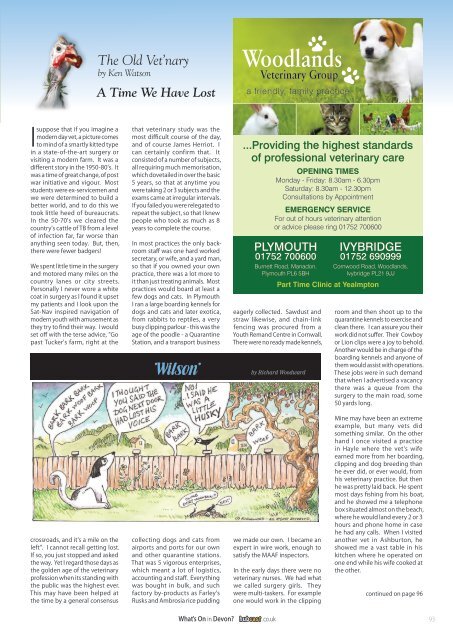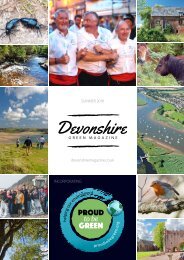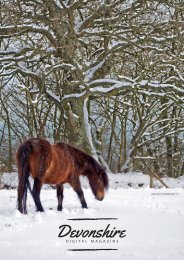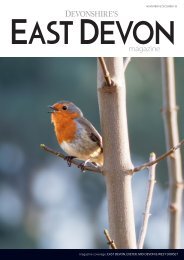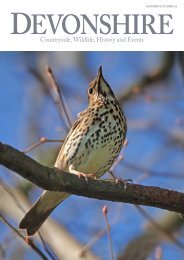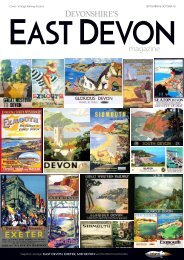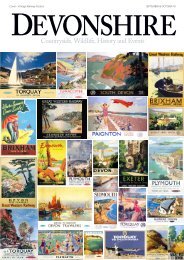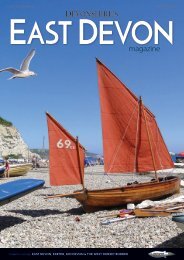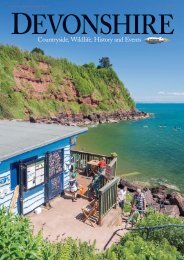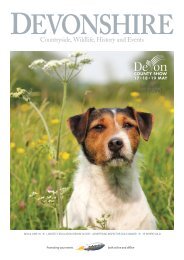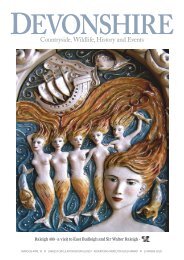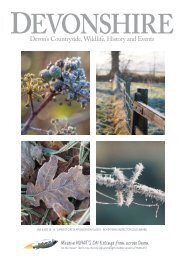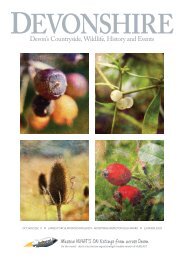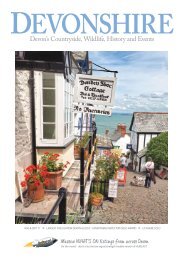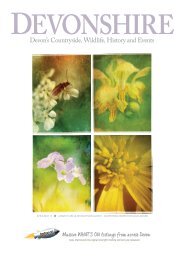Devonshire August September 16
Devon's Countryside, Events, History and Wildlife
Devon's Countryside, Events, History and Wildlife
Create successful ePaper yourself
Turn your PDF publications into a flip-book with our unique Google optimized e-Paper software.
The Old Vet’nary<br />
by Ken Watson<br />
A Time We Have Lost<br />
a friendly, family practice<br />
I<br />
suppose that if you imagine a<br />
modern day vet, a picture comes<br />
to mind of a smartly kitted type<br />
in a state-of-the-art surgery or<br />
visiting a modern farm. It was a<br />
different story in the 1950-80's. It<br />
was a time of great change, of post<br />
war initiative and vigour. Most<br />
students were ex-servicemen and<br />
we were determined to build a<br />
better world, and to do this we<br />
took little heed of bureaucrats.<br />
In the 50-70's we cleared the<br />
country's cattle of TB from a level<br />
of infection far, far worse than<br />
anything seen today. But, then,<br />
there were fewer badgers!<br />
We spent little time in the surgery<br />
and motored many miles on the<br />
country lanes or city streets.<br />
Personally I never wore a white<br />
coat in surgery as I found it upset<br />
my patients and I look upon the<br />
Sat-Nav inspired navigation of<br />
modern youth with amusement as<br />
they try to find their way. I would<br />
set off with the terse advice, "Go<br />
past Tucker's farm, right at the<br />
that veterinary study was the<br />
most difficult course of the day,<br />
and of course James Herriot. I<br />
can certainly confirm that. It<br />
consisted of a number of subjects,<br />
all requiring much memorisation,<br />
which dovetailed in over the basic<br />
5 years, so that at anytime you<br />
were taking 2 or 3 subjects and the<br />
exams came at irregular intervals.<br />
If you failed you were relegated to<br />
repeat the subject, so that I knew<br />
people who took as much as 8<br />
years to complete the course.<br />
In most practices the only backroom<br />
staff was one hard worked<br />
secretary, or wife, and a yard man,<br />
so that if you owned your own<br />
practice, there was a lot more to<br />
it than just treating animals. Most<br />
practices would board at least a<br />
few dogs and cats. In Plymouth<br />
I ran a large boarding kennels for<br />
dogs and cats and later exotica,<br />
from rabbits to reptiles, a very<br />
busy clipping parlour - this was the<br />
age of the poodle - a Quarantine<br />
Station, and a transport business<br />
'Wilson'<br />
...Providing the highest standards<br />
of professional veterinary care<br />
OPENING TIMES<br />
Monday - Friday: 8.30am - 6.30pm<br />
Saturday: 8.30am - 12.30pm<br />
Consultations by Appointment<br />
EMERGENCY SERVICE<br />
For out of hours veterinary attention<br />
or advice please ring 01752 700600<br />
PLYMOUTH<br />
01752 700600<br />
Burnett Road, Manadon,<br />
Plymouth PL6 5BH<br />
IVYBRIDGE<br />
01752 690999<br />
Cornwood Road, Woodlands,<br />
Ivybridge PL21 9JJ<br />
Part Time Clinic at Yealmpton<br />
eagerly collected. Sawdust and<br />
straw likewise, and chain-link<br />
fencing was procured from a<br />
Youth Remand Centre in Cornwall.<br />
There were no ready made kennels,<br />
by Richard Woodward<br />
room and then shoot up to the<br />
quarantine kennels to exercise and<br />
clean there. I can assure you their<br />
work did not suffer. Their Cowboy<br />
or Lion clips were a joy to behold.<br />
Another would be in charge of the<br />
boarding kennels and anyone of<br />
them would assist with operations.<br />
These jobs were in such demand<br />
that when I advertised a vacancy<br />
there was a queue from the<br />
surgery to the main road, some<br />
50 yards long.<br />
crossroads, and it's a mile on the<br />
left". I cannot recall getting lost.<br />
If so, you just stopped and asked<br />
the way. Yet I regard those days as<br />
the golden age of the veterinary<br />
profession when its standing with<br />
the public was the highest ever.<br />
This may have been helped at<br />
the time by a general consensus<br />
collecting dogs and cats from<br />
airports and ports for our own<br />
and other quarantine stations.<br />
That was 5 vigorous enterprises,<br />
which meant a lot of logistics,<br />
accounting and staff. Everything<br />
was bought in bulk, and such<br />
factory by-products as Farley's<br />
Rusks and Ambrosia rice pudding<br />
we made our own. I became an<br />
expert in wire work, enough to<br />
satisfy the MAAF inspectors.<br />
In the early days there were no<br />
veterinary nurses. We had what<br />
we called surgery girls. They<br />
were multi-taskers. For example<br />
one would work in the clipping<br />
Mine may have been an extreme<br />
example, but many vets did<br />
something similar. On the other<br />
hand I once visited a practice<br />
in Hayle where the vet's wife<br />
earned more from her boarding,<br />
clipping and dog breeding than<br />
he ever did, or ever would, from<br />
his veterinary practice. But then<br />
he was pretty laid back. He spent<br />
most days fishing from his boat,<br />
and he showed me a telephone<br />
box situated almost on the beach,<br />
where he would land every 2 or 3<br />
hours and phone home in case<br />
he had any calls. When I visited<br />
another vet in Ashburton, he<br />
showed me a vast table in his<br />
kitchen where he operated on<br />
one end while his wife cooked at<br />
the other.<br />
continued on page 96<br />
hubcast 93


